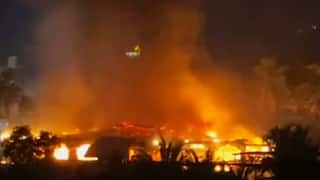Bangladesh Army Chief Vows Full Support To Interim Govt For Reforms: 'Stand By Yunus, Come What May'
In an interview to news agency Reuters, General Waker-uz-Zaman also outlines a plan to rid the military of political influence.

Bangladesh army chief General Waker-uz-Zaman on Monday vowed full support to the interim government in implementing crucial reforms following the ouster of Prime Minister Sheikh Hasina, so that elections can be held in the next 18 months.
In an interview to news agency Reuters, Zaman said the interim administration led by Nobel laureate Muhammad Yunus had his full support. He also outlined a plan to rid the military of political influence. "I will stand beside him. Come what may. So that he can accomplish his mission," Zaman said, as quoted by the news agency.
In August, Zaman and his troops stood aside during the raging student-led protests against Hasina that led to her ouster from power after 15 years. Hasina subsequently fled to India, and continues to be here.
As he took the reins of the interim government formed in Bangladesh, Yunus, the pioneer of the microcredit movement, vowed to implement crucial reforms in the judiciary, police and financial institutions to facilitate "free and fair elections in Bangladesh". Zaman, who took over as army chief weeks before Hasnia’s ouster, said while the transition back to democracy should take between a year and six months, patience would be needed.
The country’s two main parties, Hasina's Awami League and its rival Bangladesh Nationalist Party, had previously called for elections to be held within three months of the interim government taking office in August.
The interim government’s chief adviser and the army chief meet every week and have “good relations”, Zaman said, adding that the military is helping the interim government’s effort to stabilise the country after a period of turmoil. "I'm sure that if we work together, there is no reason why we should fail," he said.
On August 5, Hasina’s government was toppled after more than 1,000 people were killed in violent clashes that began as a movement against public sector job quotas in July. The protests subsequently escalated into a wider anti-government uprising, and the Hasina government's crackdown on the demonstrators intensified calls for her removal.
Calm has returned to the bustling streets of Dhaka since, but some parts of the civil service are reportedly not yet properly functional after the dramatic fall of Hasina's administration.
In the 51 years since it became a country, Bangladesh has had multiple trysts with coups, successful and attempted. However, General Zaman has promised to keep his force “professional”, saying it would not intervene politically. "I will not do anything which is detrimental to my organisation," he told Reuters. "I am a professional soldier. I would like to keep my army professional."






































